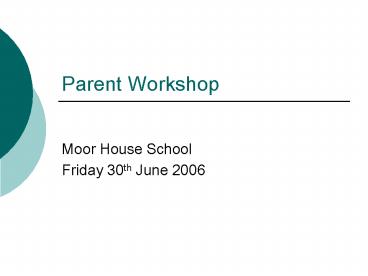Parent Workshop - PowerPoint PPT Presentation
1 / 18
Title:
Parent Workshop
Description:
Parent Workshop. Moor House School. Friday 30th June 2006. Format of Workshop ... What do we mean by 'Life Skills' ... A chance to think about how to break ... – PowerPoint PPT presentation
Number of Views:840
Avg rating:3.0/5.0
Title: Parent Workshop
1
Parent Workshop
- Moor House School
- Friday 30th June 2006
2
Format of Workshop
- Introduction / Learning Objectives
- What do we mean by Life Skills
- What we currently do in MHS to support
development towards independence - KS2 (Annis)
- KS3 (Sarah)
- KS4 (Catherine)
- Breaking tasks down (Jo Moore)
- Life Skills Checklist (Jo Moore)
- Group Activity (all)
- Share group work
- Coffee /Tea
- Finish
3
Working Towards Independence- An Introduction
- Todays session is
- An exploratory session
- An informal two way learning process
- A sharing of ideas
- Work towards a shared terminology
- A work in progress
- A chance to think about how to break everyday
tasks down - A chance to learn possible ways of how to support
the development of these skills - A chance to think about home/school partnership
4
What do we mean by life skillsSome examples
- Personal and domestic activities of daily living
e.g. dressing washing, laundry, washing up - Independent Travel
- Road Safety
- Functional communications skills underpin all of
these - Functional academics e.g. read a timetable,
telling the time - Managing health and wellbeing
- Relationships
- Knowledge of self e.g. personal details
- Leisure and play
- Use of public facilities e.g locating bus
numbers, shopping, café, leisure centre
5
LITERACY
SOCIAL SKILLS
Reading
LANGUAGE
Eye contact
Eye contact
Spelling
Comprehension
Turn taking
Turn taking
Talking
Tone of voice
Tone of voice
PRAGMATIC SKILLS
Motivation
Appropriacy
CONFIDENCE
LIFE SKILLS
Practice/ Experience
Repair
Typing
Adding
Handwriting
Multiplying
Fine motor component
SENSORY/MOTOR
Sequencing
Planning
NUMERACY
COGNITION
6
KS2
- Designated list of jobs e.g. everyday household
tasks, clearing the table Sense of
responsibility which they are supported in
learning how to do - A chance to integrate strategies into real life
situations - Identify specific needs of pupils which may need
additional input e.g. OT in morning working
jointly with care staff to focus on dressing
skills/ ties and buttons and general organisation
- Evening groups focusing on sensory cooking
group learning kitchen skills washing up,
following simple recipes independently, working
in pairs with a member of staff - An activity group working on motor skills and
planning and negotiating, problem solving and
organising. Planned simple tasks eg. turn taking
games, learning about team working, gradually
building up to a big team game - Individual childcare targets focus on pupils
specific functional difficulties - Must be fun as it is in the pupils free time and
needs to be motivating
7
KS3
- Life/Social Skills programme -Key steps, Social
Skills groups and Make It Real Game - Trips out four times per term
- Multidisciplinary approach
- Joint planning/evaluation weekly
- Individual groups e.g. girls group
- IE strategies transferred into real life
8
A KS3 Approach To Life Skills
KEYSTEPS Subject Options and Career Choices
SOCIAL SKILLS Applying conversations to the
interview setting
LIFESKILLS OPPORTUNITIES GOING LIVE!
MAKE IT REAL GAME Job adverts Job
search Interviews Lifestyle Choices
9
KS4
10
KS4 Timetable
11
KS4 Life Skills Checklist
12
KS4
- Transition Home Module
13
Breaking Tasks Down
- Using a public telephone
14
The MHS Life Skills Checklist- An Introduction
- A checklist for all pupils to measure progress on
life skills at MH which other tests do not cover - Devised by a multidisciplinary team of staff at
MHS - To follow the pupil all the way through school
and beyond - A working document to be updated regularly by the
whole team - Will help identify integration needs
- Pupil will have input as well as staff
- Parents will have an opportunity to input in
termly meetings - Held centrally on computer
15
Example of making a call from a public phone box
- Knowledge of procedure/task
- Procedural steps
- Lift receiver
- Follow instructions
- Put card or money in first
- Dial number
- Wait for an answer
- Talk
- Put more money in if needed
- Replace receiver
16
Performance components required for making a call
from a public phone box
- Sensory Motor
- Cognition
- Numeracy
- Literacy
- Confidence
- Language and speech
- Social skills/Pragmatics
17
Group Activity
- Get into groups
- Think of a life skill that your child has
difficulty with - Identify the skills underpinning the task
- Try to think about ways of supporting the
development of these skills
18
Close..































